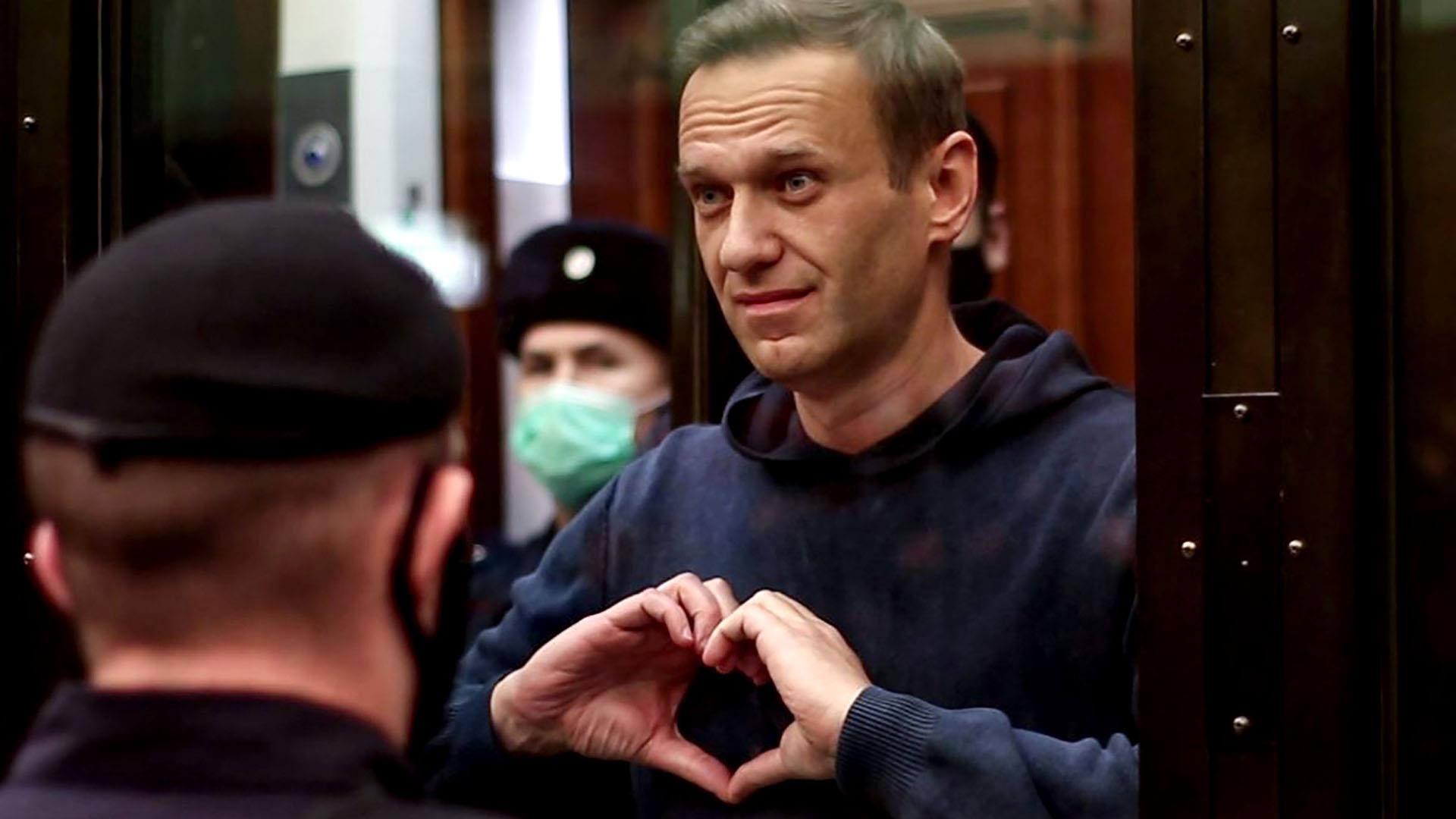Alexei Navalny in a touching scene from “Navalny” where he makes heart signs to his wife while being sentenced in a Russian courtroom in 2021. PHOTO CREDIT: NBC News
“I would rate the job as well done,” says Konstantin Kudryavtsev, a member of the team hired to poison Alexei Navalny, the most prominent opposition leader in Russia.
Not realizing Navalny is the voice on the other end of the phone, Kudryavtsev continues, “…when the flight made an emergency landing the situation changed, not in our favor. If the flight was a bit longer, I think things would have gone the other way.”
The camera focuses on Navalny who remains calm and continues deceiving Kudryavtsev into divulging the details surrounding the failed attempt on his life linked to the Kremlin.
It’s a riveting moment from the Oscar winning documentary “Navalny” streaming on HBO Max. The film covers his near fatal poisoning in 2020 followed by a months-long recovery in Germany, along with his return to Russia in 2021.
His logical approach to this nerve-racking situation sums up why Vladimir Putin refuses to utter his name.
“Navalny” is a moving portrait of a man fighting dictatorship with a relentless tenacity supported by his loving wife Yulia Navalnaya and their two children Dasha and Zakhar.
In one scene, Dasha describes knowing at thirteen her dad could be killed and mentions him almost missing her high school graduation because he was arrested “for doing the right thing.”
Navalnaya looks like the leading lady in a Hitchcock film with platinum blonde hair and stoic grace. She charges on screen, fighting for her husband to receive proper medical care after his poisoning. Yet, despite the seriousness of their situation, the two surprisingly maintain a sense of humor throughout the film, adding a lightness to some of the heavier subject matter.
Navalnaya is called the First Lady of the Russian opposition and is compared to Belarusian political activist and exile Sviatlana Tsikhanouskaya, whose husband, like Navalnaya’s, was jailed for opposing a corrupt government.
Countless attempts to silence Navalny have been made, like jailing his brother Oleg Navalny in 2014 on charges Reuters and other media outlets reported as “politically motivated.”
Supporters saw his brother’s arrest as a return to the Soviet-era method of punishing dissenters by going after their family.
2020 was not the first time the Kremlin was linked to a physical attack on Navalny. In 2017 he required surgery to save the vision in his right eye from a chemical burn after an assailant splashed toxic green dye on his face.
The list of Putin’s actual opponents, not the fake ones created by the Kremlin, who are exiled, poisoned, jailed or found dead under mysterious circumstances is lengthy.
Last week, revered Russian journalist and human rights advocate, Vladimir Kara-Murza, was sentenced to 25 years on treason charges for his work denouncing the war in Ukraine.
Kara-Murza was brought into opposition politics by Boris Nemtsov, another Putin opponent who was gunned down outside Kremlin headquarters on his walk home in 2015. And similar to Navalny’s case, Kara-Murza survived poisoning attempts in 2015 and 2017.
Novichok, the chemical used to poison Navalny, was invented by Russia in the 70s. It stops messages between nerves and muscles causing bodily functions to deteriorate.
The documentary highlights Novichok as the signature murder weapon of Putin’s regime because it disappears from the body without a trace making it perfect to target individuals whose deaths would be investigated. Russia’s use of Novichok can be considered a war crime according to the House of Commons Library.
As the documentary concludes, Navalny and Navalnaya return to Russia in January of 2021.
As throngs of supporters and anti-riot police clash waiting for Navalny at Vnukovo Airport, his flight is diverted to another less crowded Moscow airport where he is promptly arrested and sentenced to 2.5 years on politically motivated charges. Two additional charges were tacked on later totaling over 20 years.
Navalny’s team recently feared another poisoning attempt inside the maximum security prison he’s in as he suffered severe stomach pains and rapidly lost weight. A recent post on his Twitter says prison authorities are restricting his food which could also be blamed for these health conditions.
According to Reuters, last week Navalny was accused of “thwarting prison authorities” after the administration orchestrated an altercation between him and a fellow inmate. He faces two new charges, one for extremism and the other for terrorism, if found guilty he could be jailed for life.
Navalny’s final message to the Russian people, “The only thing necessary for the triumph of evil, is for good people to do nothing. So don’t be inactive.”




